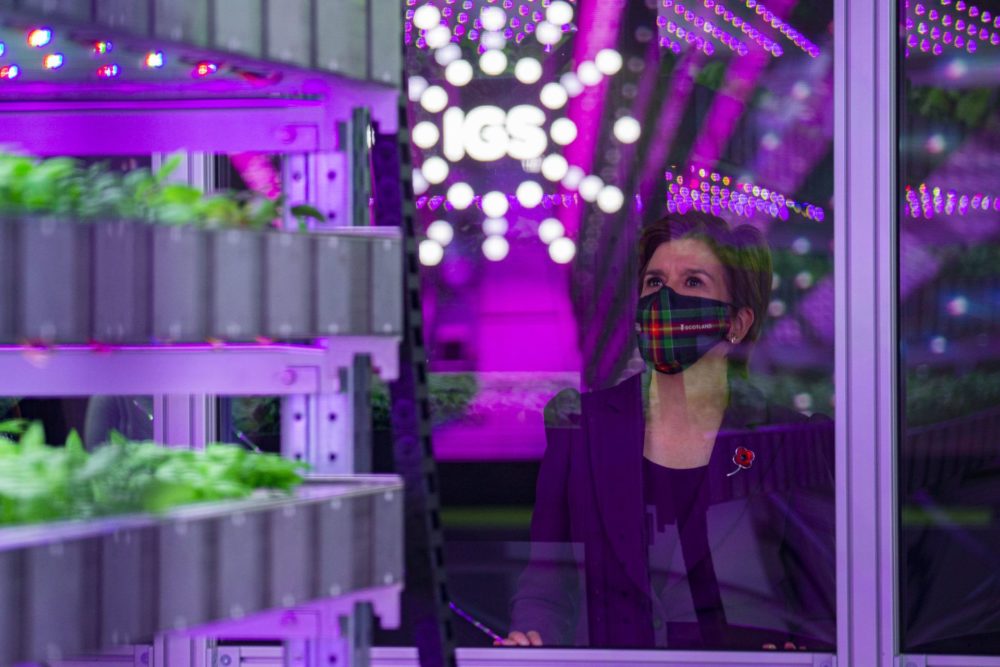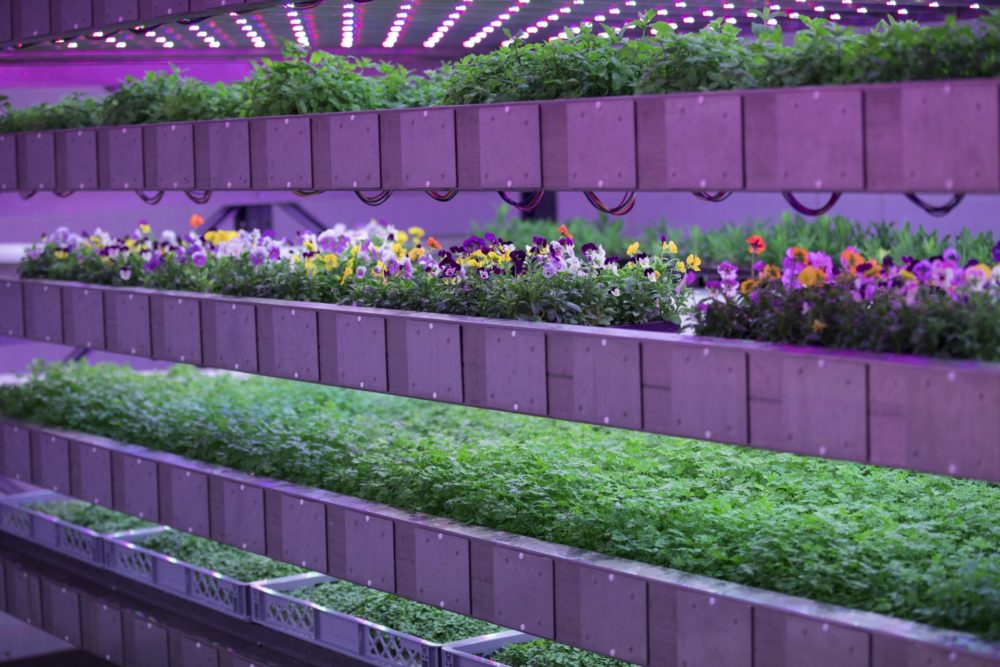Disclosure: AFN’s parent company, AgFunder, is an investor in IGS.
UK vertical farming tech startup Intelligent Growth Solutions (IGS) has raised £42.2 million ($57.7 million) in Series B funding.
The round was led by Swiss conglomerate COFRA, which was joined by two other new investors: US VC firm Cleveland Avenue, and UK media and publishing company DC Thomson.
US agrifoodtech VC firms AgFunder, S2G Ventures, and Ospraie Ag Science — all existing IGS investors — also participated, as did the Scottish government’s Scottish Enterprise, several private shareholders, and IGS staff.
The close of the Series B round was announced by Scottish First Minister Nicola Sturgeon at the COP26 UN climate change summit in Glasgow, where IGS is showcasing its technology by means of a temporary 5.4 meter-high vertical farm it has erected on site.
Sturgeon congratulated the IGS team and said that technologies like those it is developing will be essential in transitioning the world to a more sustainable future. She also pointed to the poignancy of the announcement and climate summit being held in Glasgow, the birthplace of the industrial revolution.
“Here at COP26, it’s fantastic to see a Scottish company at the forefront of innovation in agritech and vertical farming attracting investment from across the world,” she said. “The success of IGS shows that the transition to ‘net zero’ can create new opportunities for fair work and prosperity.”

IGS designs and builds vertical farms for third-party operators, and provides them with the technology to get their farms up and running. It claims that its technology is used by customers across four continents.
Open-field farmer Henry Aykroyd established IGS in 2013. He wanted a way to continue cultivating crops during Scotland’s cold and murky winters, effectively giving him a 12-month growing season, and he explored vertical farming technology as a way of doing it. However, finding the existing options far too expensive and energy-inefficient, Aykroyd enlisted engineer — and eventual chief technology officer — Dave Scott to help him build a solution from scratch.
Software industry veteran David Farquhar joined IGS as CEO in 2017. Describing himself as a “student” of Crossing the Chasm — the seminal 1990s tech tome that identified the perilous gap that startups must traverse between early adopters and mainstream consumers — he opted to steer the IGS ship in a different direction.
“Before I joined, we were going to grow for commercial sale,” he told AFN. “I looked at the markets [and] I was absolutely sure the behavior I saw in the market suggested a chasm-crossing was coming up in few years.”
A covenant with the market
Rather than becoming a farming operation as well as a tech company, Farquhar and his team decided to focus purely on the latter, selling their solutions to agricultural businesses. When a chasm-crossing is on the horizon, “don’t try to ride two horses at once,” he suggested.
At that point, IGS “made a covenant with the market to say we would never grow crops for commercial sale. We grow some for R&D purposes – and what we do grow, we give away philanthropically. But we will never compete with our customers,” he said.
Instead, empowerment of farmers and entrepreneurs — and enabling them to build a more sustainable food system — became the aim.
IGS’s ‘plug-and-play’ growth towers range from around six to 12 meters in height; a pair of the smallest configuration provides 42 square meters of growing space. The modular nature of the offering means that a wide variety of customers can make the most of the Edinburgh-based startup’s technology. Existing customers include France’s Jungle and Australia’s Eden Towers, with more new customer announcements expected in the coming weeks.
“We’ve spent the money to take the R&D risk away from them,” Farquhar said. “We can provide towers [sized] depending on the building and space around you. The system is completely modular, and it can become industrial – so you start with two towers, and later you go to twenty towers, or a hundred, or more. It can grow with your business, so it is productized, it is scalable, and it is agile.”
But it isn’t just the new crop of vertical ag startups who are turning to IGS tech. Open-field growers seeking diversification, shorter growth cycles, and more reliable and localized sources of seed stock are also among its customers.
“For six-inch-high broccoli and seed potatoes, we’ve cracked both. [We can reduce] the growth cycle from 18 months to 75 days across six varieties [of potatoes], and for brassicas from two months to 11 days,” Farquhar said; while average survival rates of seedlings for both crops in IGS’s system, where they are protected from the elements, is over 95%.
Sustainability credentials
The other benefit of the IGS system — and the aspect that drove the startup’s participation at COP26 — is its sustainability credentials.
“We can use renewable energy, and we can use zero hydrocarbons. There are not even carbon-based lubricants in the system,” Farquhar said. “And because we don’t allow humans in the growing area — it’s all done by robots — we don’t need to use pesticides, we don’t need to wash the produce, and therefore its shelf life is longer and wastage goes down.”

Part of the magic of the now fully-automated solution is in its treatment of electricity, which is a major pain point and cost for existing players. Powering the farms and their LED lights is energy-intensive.
IGS has a patent for using three-phase electricity with LED lights as opposed to the typical single-phase, which is what causes lights to flicker — as well as poor phase balancing and harmonics issues — which are all barriers to using LED lights at scale, Scott told AFN on the sidelines of COP26 this week.
“Driving the lights this way saves money as you can use low voltages and reduces the carbon footprint. Low voltages also mean safety within the growing environment at a very low cost,” Scott said.
“The small amount of waste heat generated from the LEDs is used within the HVAC [heating, ventilation, and air conditioning] system, reducing the energy needed by 40% compared to running expensive, traditional HVAC systems constantly.”
Sales quadrupled
Since the start of the year, IGS has seen its sales quadruple, while the team has grown from 25 to 140 employees.
“We are building farms on four continents, with one deal in the pipeline on a fifth continent,” Farquhar said.
At today’s announcement, the company said it was expanding its relationship with the aforementioned Jungle. The French startup is growing a variety of crops, including lilies for the perfume industry, which Farquhar said was a “world-first.”
Commenting on the Series B round, COFRA director and IGS board member Donald Brenninkmeijer said that “a growing population putting ever greater strain on resources and the environment [means] there is an urgent need for sustainable, high-yield forms of food production.”
“We’re excited to support IGS on its journey to resolve the dual challenge of food insecurity and environmental degradation,” he said in a statement. “IGS’s technology is unique, its growth plan solid, and we are confident in its potential to rethink the future of agricultural food systems. This first investment [of COFRA’s] in sustainable food systems is consistent with COFRA’s longstanding commitment to using business and capital as a force for good.”
IGS’s vertical farm exhibition for COP26 is open to the public at the Sustainable Glasgow Landing until November 12. Schools can schedule guided tours for pupils here.




